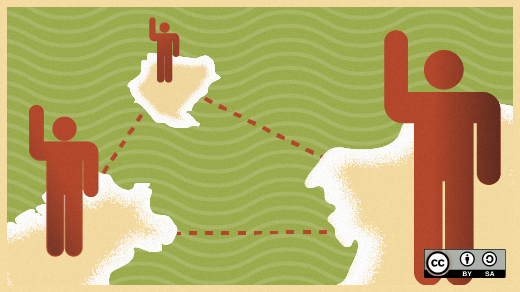Passionate debate is among the hallmark traits of open source communities and open organizations. On our best days, these debates are energetic and constructive. They are heated, yet moderated with humor and goodwill. All parties remain focused on facts, on the shared purpose of collaborative problem-solving, and driving continuous improvement. And for many of us, they're just plain fun.
On our worst days, these debates devolve into rehashing the same old arguments on the same old topics. Or we turn on one another, delivering insults—passive-aggressive or outright nasty, depending on our style—and eroding the passion, trust, and productivity of our communities.
We've all been there, watching and feeling helpless, as a community conversation begins to turn toxic. Yet, as DeLisa Alexander recently shared, there are so many ways that each and every one of us can be a force for good in our communities.
In the first article of this "open culture" series, I will share a few strategies for how you can intervene, in that crucial moment, and steer everyone to a more positive and productive place.
Don't call people out. Call them up.
Recently, I had lunch with my friend and colleague, Mark Rumbles. Over the years, we've collaborated on a number of projects that support open culture and leadership at Red Hat. On this day, Mark asked me how I was holding up, as he saw I'd recently intervened in a mailing list conversation when I saw the debate was getting ugly.
Fortunately, the dust had long since settled, and in fact I'd almost forgotten about the conversation. Nevertheless, it led us to talk about the challenges of open and frank debate in a community that has thousands of members.
Mark said something that struck me as rather insightful. He said, "You know, as a community, we are really good at calling each other out. But what I'd like to see us do more of is calling each other up."
Mark is absolutely right. One of the biggest ways we can be a force for good in our communities is to respond to conflict in a way that compels everyone to elevate their behavior, rather than escalate it.
Assume positive intent
We can start by making a simple assumption when we observe poor behavior in a heated conversation: It's entirely possible that there are positive intentions somewhere in the mix.
This is admittedly not an easy thing to do. When I see signs that a debate is turning nasty, I pause and ask myself what Steven Covey calls The Humanizing Question:
"Why would a reasonable, rational, and decent person do something like this?"
Now, if this is one of your "usual suspects"—a community member with a propensity toward negative behavior--perhaps your first thought is, "Um, what if this person isn't reasonable, rational, or decent?"
Stay with me, now. I'm not suggesting that you engage in some touchy-feely form of self-delusion. It's called The Humanizing Question not only because asking it humanizes the other person, but also because it humanizes you.
And that, in turn, helps you respond or intervene from the most productive possible place.
Seek to understand the reasons for community dissent
When I ask myself why a reasonable, rational, and decent person might do something like this, time and again, it comes down to the same few reasons:
- They don't feel heard.
- They don't feel respected.
- They don't feel understood.
One easy positive intention we can apply to almost any poor behavior, then, is that the person wants to be heard, respected, or understood. That's pretty reasonable, I suppose.
By standing in this more objective and compassionate place, we can see that their behavior is almost certainly not going to help them get what they want, and that the community will suffer as a result . . . without our help.
For me, that inspires a desire to help everyone get "unstuck" from this ugly place we're in.
Before I intervene, though, I ask myself a follow-up question: What other positive intentions might be driving this behavior?
Examples that readily jump to mind include:
- They are worried that we're missing something important, or we're making a mistake, and no one else seems to see it.
- They want to feel valued for their contributions.
- They are burned out, because of overworking in the community or things happening in their personal life.
- They are tired of something being broken and frustrated that no one else seems to see the damage or inconvenience that creates.
- ...and so on and so forth.
With that, I have a rich supply of positive intent that I can ascribe to their behavior. I'm ready to reach out and offer them some help, in the form of an out.
Give the gift of an out
What is an out? Think of it as an escape hatch. It's a way to exit the conversation, or abandon the poor behavior and resume behaving like a decent person, without losing face. It's calling someone up, rather than calling them out.
You've probably experienced this, as some point in your life, when you were behaving poorly in a conversation, ranting and hollering and generally raising a fuss about something or another, and someone graciously offered you a way out. Perhaps they chose not to "take the bait" by responding to your unkind choice of words, and instead, said something that demonstrated they believed you were a reasonable, rational, and decent human being with positive intentions, such as:
So, uh, what I'm hearing is that you're really worried about this, and you're frustrated because it seems like no one is listening. Or maybe you're concerned that we're missing the significance of it. Is that about right?
And here's the thing: Even if that wasn't entirely true (perhaps you had less-than-noble intentions), in that moment, you probably grabbed ahold of that life preserver they handed you, and gladly accepted the opportunity to reframe your poor behavior. You almost certainly pivoted and moved to a more productive place, likely without even recognizing it.
Perhaps you said something like, "Well, it's not that exactly, but I just worry that we're headed down the wrong path here, and I get what you're saying that as community, we can't solve every problem at the same time, but if we don't solve this one soon, bad things are going to happen…"
In the end, the conversation almost certainly began to move to a more productive place, or you all agreed to disagree.
We all have the opportunity to offer an upset person a safe way out of that destructive place they're operating from. Here's how.
Bad behavior or bad actor?
If the person is particularly agitated, they may not hear or accept the first out you hand them. That's okay. Most likely, their lizard brain--that prehistoric amygdala that was once critical for human survival—has taken over, and they need a few more moments to recognize you're not a threat. Just keep gently but firmly treating them as if they were a rational, reasonable, decent human being, and watch what happens.
In my experience, these community interventions end in one of three ways:
Most often, the person actually is a reasonable person, and soon enough, they gratefully and graciously accept the out. In the process, everyone breaks out of the black vs. white, "win or lose" mindset. People begin to think up creative alternatives and "win-win" outcomes that benefit everyone.
Occasionally, the person is not particularly reasonable, rational, or decent by nature, but when treated with such consistent, tireless, patient generosity and kindness (by you), they are shamed into retreating from the conversation. This sounds like, "Well, I think I've said all I have to say. Thanks for hearing me out." Or, for less enlightened types, "Well, I'm tired of this conversation. Let's drop it." (Yes, please. Thank you.)
Less often, the person is what's known as a bad actor, or in community management circles, a pot-stirrer. These folks do exist, and they thrive on drama. Guess what? By consistently engaging in a kind, generous, community-calming way, and entirely ignoring all attempts to escalate the situation, you effectively shift the conversation into an area that holds little interest for them. They have no choice but to abandon it. Winners all around.
That's the power of assuming positive intent. By responding to angry and hostile words with grace and dignity, you can diffuse a flamewar, untangle and solve tricky problems, and quite possibly make a new friend or two in the process.
Am I successful every time I apply this principle? Heck, no. But I never regret the choice to assume positive intent. And I can vividly recall a few unfortunate occasions when I assumed negative intent and responded in a way that further contributed to the problem.
Now it's your turn. I'd love to hear about some strategies and principles you apply, to be a force for good when conversations get heated in your community. Share your thoughts in the comments below.
Next time, we'll explore more ways to be a force for good in your community, and I'll share some tips for handling "Mr. Grumpy."






3 Comments